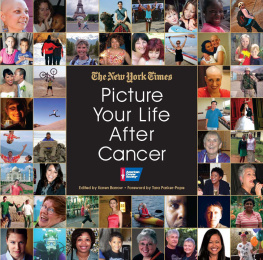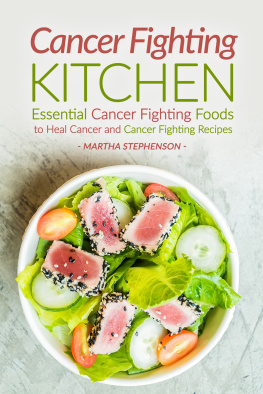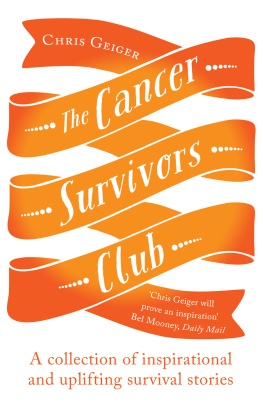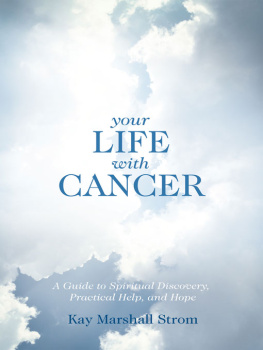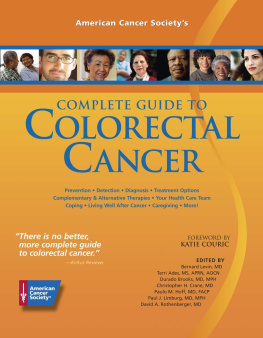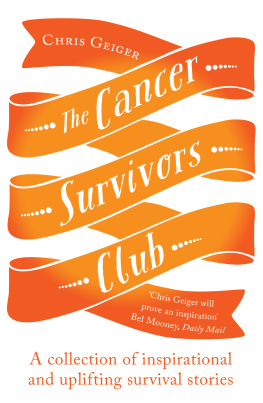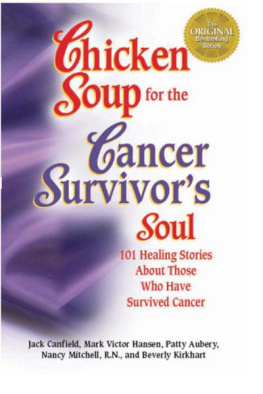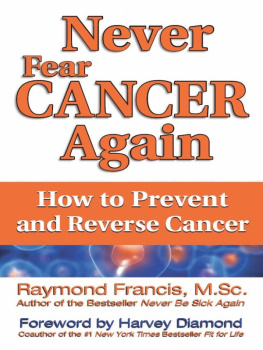


Published by the American Cancer Society
Health Promotions
250 Williams Street NW
Atlanta, Georgia 30303 USA
Copyright 2012 The New York Times
All rights reserved. Without limiting the rights under copyright reserved above, no part of this publication may be reproduced, stored in or introduced into a retrieval system, or transmitted in any form or by any means (electronic, mechanical, photocopying, recording, or otherwise) without the prior written permission of the publisher and The New York Times.
Manufactured by RR Donnelley
Manufactured in Willard, OH, in September 2012
Job #28045
Printed in the United States of America
Design and composition by La Shae V. Ortiz
The accounts reproduced in this book are solely those of the people featured and do not represent the opinions of the American Cancer Society. The American Cancer Society does not provide personal medical advice, and the accounts in this book should not be construed as such advice. The American Cancer Society does not endorse any third party goods or services mentioned in this book.
5 4 3 2 1 12 13 14 15 16
Library of Congress Cataloging-in-Publication Data
Picture your life after cancer / the New York Times; edited by Karen Barrow;
foreword by Tara Parker Pope.
p. cm.
ISBN 978-1-60443-063-9 (hardcover: alk. paper)ISBN 1-60443-063-X (hardcover: alk. paper)
1. CancerPatientsAnecdotes. 2. CancerPatientsPortraits. I. Barrow, Karen.
II. American Cancer Society. III. New York Times.
RC265.5.P53 2012
616.994dc23
2012026394
AMERICAN CANCER SOCIETY
Managing Director, Content: Chuck Westbrook
Director, Cancer Information: Terri Ades, DNP, FNP-BC, AOCN
Director, Book Publishing: Len Boswell
Managing Editor, Book Publishing: Rebecca Teaff, MA
Senior Editor, Book Publishing: Jill Russell
Book Publishing Coordinator: Vanika Jordan, MSPub
Editorial Assistant, Book Publishing: Amy Rovere
For more information about cancer, contact your American Cancer Society at 800-227-2345 or cancer.org.
Quantity discounts on bulk purchases of this book are available. For information, please contact the American Cancer Society, Health Promotions Publishing, 250 Williams Street NW, Atlanta, GA 30303-1002, or send an e-mail to .
Foreword
By TARA PARKER-POPE
Whether you have cancer or love someone who does, a cancer diagnosis is the kind of event that ultimately redefines and reshapes your life. Cancer. The word itself carries so much weight and uncertainty that the moment you hear it, your life is suddenly divided into two distinct parts: what happens before the cancer, and everything that happens after it. This book is about the second part, that is, the days and weeks and months and years after cancer.
An estimated 13.7 million people living in the United States today were told at some point in their lives that they had cancer. Some of them received the news only recently and perhaps are still undergoing the various rounds of doctor visits and treatments that follow a cancer diagnosis. Others are farther along in their cancer journey, having already soldiered through numerous surgeries, chemotherapy sessions, and radiation treatments. The latter group are no longer cancer patients; they are survivors.
And then there are the cancer veterans, those people who are long past the initial diagnosis and treatment but for whom cancer still remains a daily experience. They may be in the late stages of the disease or dealing with a recurrence, taking one day at a time as they learn to live and love and even thrive in the shadow of cancer.
Finally, there are countless others who dont have the disease but love someone who doesa friend, a child, a parent, a husband or wife, partner or coworker. Every person whose life has been touched by cancer has a story to tell.
As a health journalist, I have been awed by the people I have met over the years who have so generously shared their own stories of inspiration and desperation, the highs and lows, the victories and the setbacks that are all part of the cancer experience. They include the late Randy Pausch, the Carnegie Mellon professor diagnosed with pancreatic cancer, made famous by his last lecture that inspired millions to dream big, embrace life, and take chances. There is Jan Guthrie of Conway, Arkansas, who has turned nearly three decades of personal experience with ovarian cancer into a clearinghouse of information to help others. There are Nathan and Elisa Bond, a young Brooklyn couple who each received a cancer diagnosis just days apart. Both remain resolute in their determinationnot only to support each other through treatment, but to keep imagining a future together, raising their young daughter.
My own cancer experience goes beyond my professional life as a journalist. Cancer has also touched many of my friends, colleagues, and family members. The most profound cancer experience in my life has been the one I shared with my mother. A diagnosis of breast cancer in her early 50s didnt seem to faze her. She opted for a mastectomy, recovered from surgery, and jumped back into her life as if cancer had been nothing but a little bump in the road. But several years later, she found herself on another cancer journey. This time the disease was esophageal adenocarcinoma, a deadly cancer fueled by years of acid reflux and, in her case, one that came with a bleak prognosis.
I formed the most remarkable memories of my mother in the nine months after her last bout with cancer. She approached her disease with a strength and calm that continue to inspire the choices I make in my own life. The grace and dignity my mother showed at the end of her life were her gifts to me. Her unwavering faith in God and family helped her husband, children, and grandchildren all picture new lives for themselves, after her cancer.
In the United States today, men have slightly less than a one in two lifetime risk of developing cancer; for women, the risk is a little more than one in three. About 77 percent of all cancers are diagnosed in persons 55 years of age and older, but cancer is by no means an old persons malady. About one in four people who receive a cancer diagnosis is under the age of 55.
I am not among those who ascribe to the belief that cancer is some sort of gift, in any form. It is a terrible disease. But I do believe that we can learn from the people who have experienced it. And that is essentially what this book is about.
In the following pages, you will meet a diverse community of cancer patients, survivors, veterans, and their families, who offer a candid look at the way cancer has changed and shaped their lives. They share stories of discovery, adventure, and self-awareness that have occurred in spite of cancer in some cases and because of it in others.
Amy Nofziger of Denver, Colorado, describes her experience this way: Cancer is just part of my life story, she says. Its a chapter, but its not the whole book. I will not let it define me. In the four years since her diagnosis, Amy has gone back to graduate school, received a job promotion, adopted a child, and traveled extensively.
Next page
